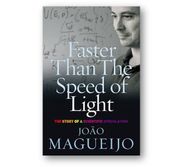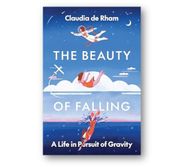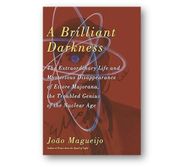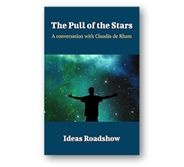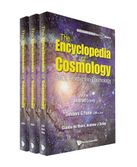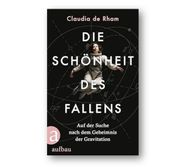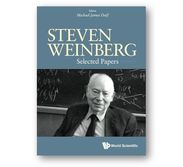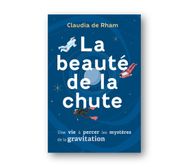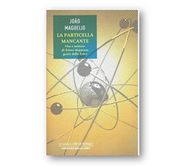Celebrating Salam's legacy at Imperial
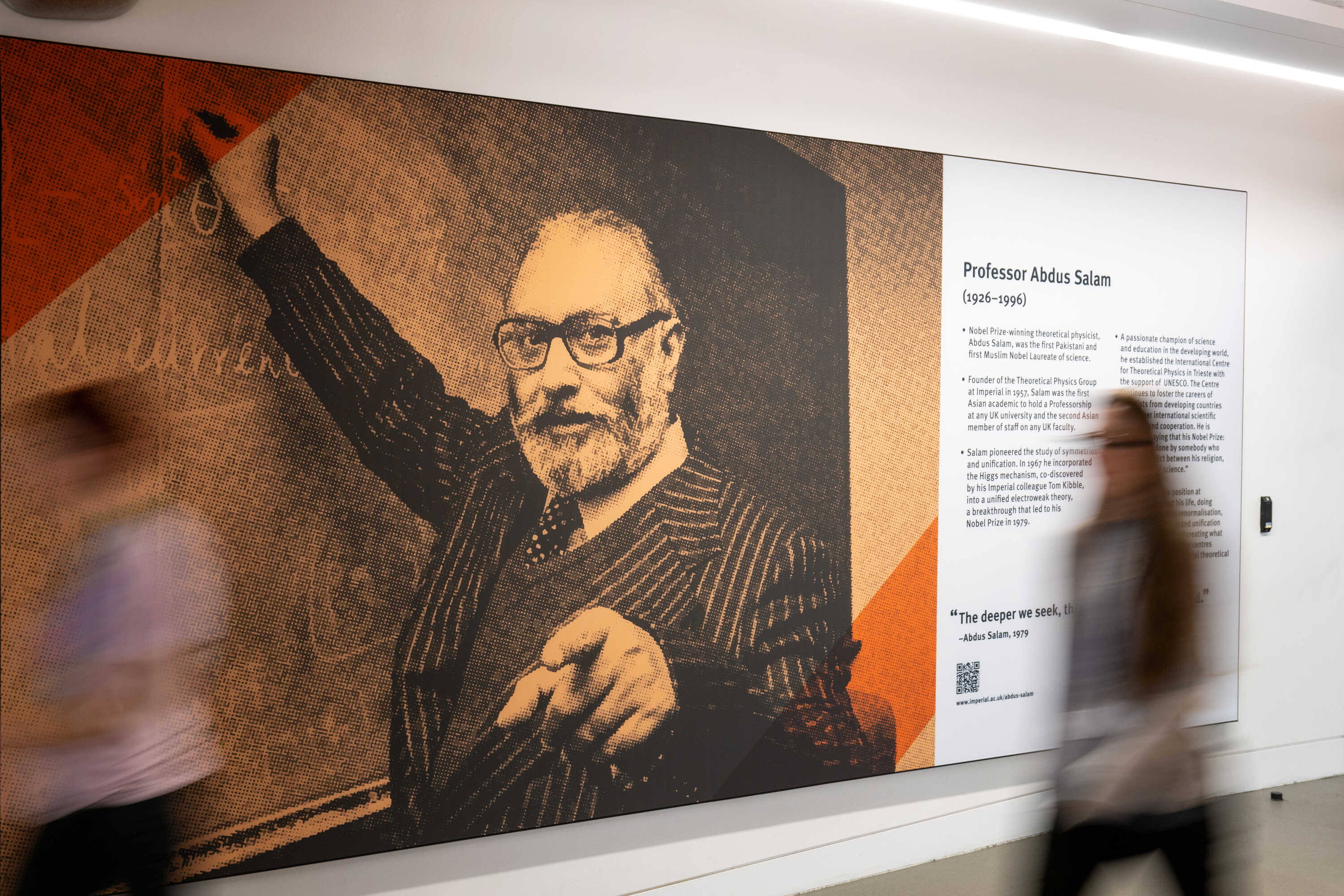 A series of engagement initiatives are taking place celebrating Prof. Abdus Salam legacy. See below for a documentary and public lectures as well as
A series of engagement initiatives are taking place celebrating Prof. Abdus Salam legacy. See below for a documentary and public lectures as well as
- Abdus Salam Exhibition
- Professor Brian Cox leads celebration of Abdus Salam’s legacy to physics
- Abdus Salam Library named in honour of leading physicist
- Salam Essay Contest
- Abdus Salam: honouring the first Muslim Nobel-prize-winning scientist – Physics World
- Abdus Salam: celebrating a unifying force in global physics – Physics World podcast
YouTube videos

Salam documentary
Abdus Salam: A unifying force
Abdus Salam (1926-1996) was a 1979 Nobel laureate in Physics, and helped found the Theoretical Physics Group at Imperial College London. He first arrived at Imperial College London in 1957 and remained a professor here for the rest of his life. Salam won the Nobel Prize, along with Sheldon Glashow and Steven Weinberg, for his work in unifying two fundamental forces of nature: electromagnetism and the weak nuclear force. Not only was Salam a brilliant theoretical physicist, but he also championed the spread of science in the developing world.

Abdus Salam and the Fundamental Forces of Nature
Public lecture and Q&A by Brian Cox and Atish Dabholkar
A special lecture hosted by Imperial Theoretical Physics and Imperial Institutional Events, to celebrate the naming of the Abdus Salam Library at Imperial. We welcome Professor Atish Dabholkar, the current Director of ICTP in Trieste, Italy, and Professor Brian Cox CBE, renowned science communicator as our key speakers.

Professor Abdus Salam +50 Conference
Public event celebrating the 50 years anniversary of Prof. Salam's Nobel prize

Tasneem Zehra Husain public lecture
Transcending Boundaries: The Life, Work and Legacy of Abdus Salam
A talk about the life, work and legacy of Pakistani Nobel Laureate, Abdus Salam. Delivered to high school students, as part of Salam Celebration Day at Imperial College, London, on January 29, 2024.

Prof. Michael Duff on Abdus Salam
Abdus Salam: Setting the Record Straight
Prof. Michael Duff was Prof. Abdus Salam student. He is a Fellow of the Royal Society, Fellow of the American Physical Society, and the 2017 winner of the Dirac Medal awarded by the Institute of Physics. This will be followed by a discussion with Prof. Qaisar Shafi (theoretical physics) at Delaware University, and Prof. Salam’s former PhD student. He is the winner of Alexander von Humboldt Prize (1997) and member of the American Physical Society. The context for the event will be laid out by Dr. Pervez Hoodbhoy.
Celebrating Hawking's legacy at Imperial
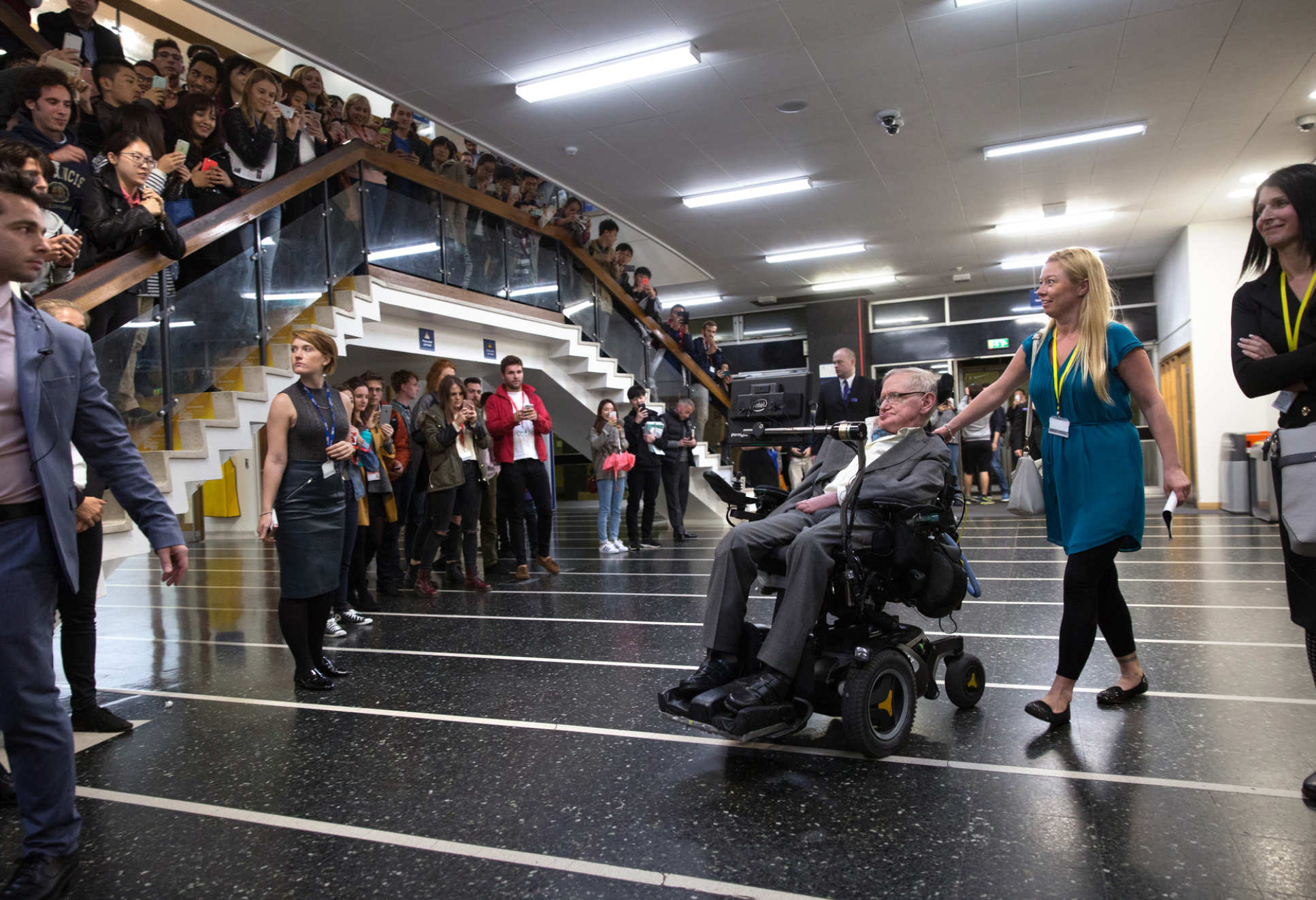 More than half the theoretical physics professors at Imperial have been working in Prof. Hawking group.
More than half the theoretical physics professors at Imperial have been working in Prof. Hawking group.
YouTube videos

Professor Stephen Hawking Q&A at Imperial
Professor Stephen Hawking live Q&A on 17 October 2016
Professor Stephen gave a public lecture at Imperial on 17 October 2016 chaired by Prof. Fay Dowker, over 25,000 people register to attend. Watch the live Q&A

Hawking Imperial honorary degree
Hawking Imperial honorary degree
Professor Stephen Hawking was awarded an honorary Doctor of Science at a special ceremony held at the Royal Society.

Fay Dowker on Stephen Hawking
Theories of Everything Podcast on Causal Set Theory, Quantum Gravity, Consciousness, Non-Locality
Theories of Everything Podcast featuring Professor Fay Dowker on Causal Set Theory, Quantum Gravity, Consciousness, Non-Locality and Stephen Hawking

The Science of Stephen Hawking
Watch Toby's personal insight into Professor Stephen Hawking unique contributions to knowledge
Professor Stephen Hawking (1942 - 2018) was an iconic scientist who worked on fundamental questions in black holes and the origin of the universe. His research was combined with a passion for communicating his work to the general public, notably in his book A Brief History of Time which was followed by many other books and TV programmes. In a celebration of his life and work, Professors Toby Wiseman and Richard Battye discussed his science. Toby and Richard both worked alongside Hawking in the Department of Applied Mathematics and Theoretical Physics at the University of Cambridge and will give a personal insight into his unique contributions to knowledge.
Celebrating Kibble&Higgs legacies at Imperial
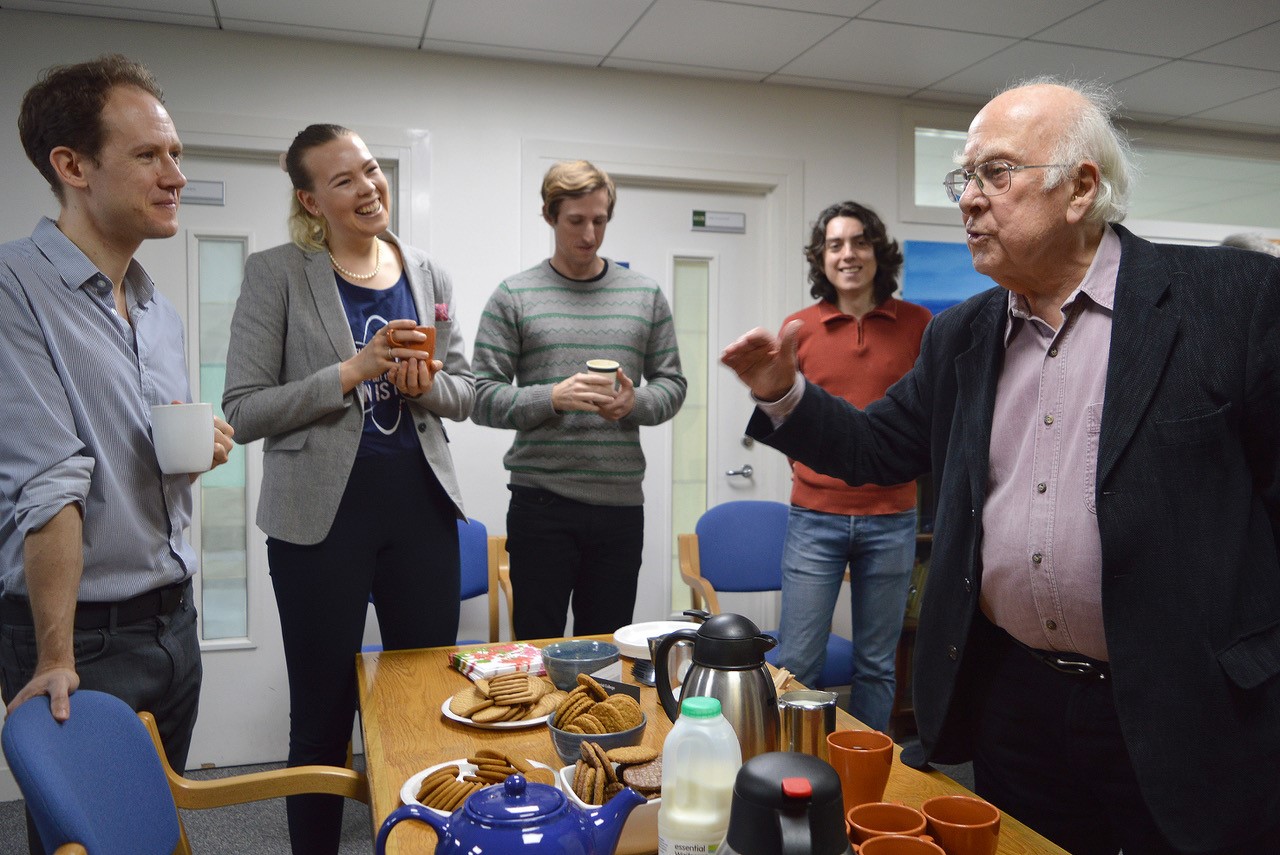 Sir Peter Higgs was a postdoc in the theory group at Imperial and Sir Tom Kibble a professor throughout his career. In 1964, Prof. Kibble theoretical work provided the basis for symmetry breaking and predicted the existence of a particle with physical properties like the Higgs boson. See below for a timeline of the boson theory and discovery at Imperial.
Sir Peter Higgs was a postdoc in the theory group at Imperial and Sir Tom Kibble a professor throughout his career. In 1964, Prof. Kibble theoretical work provided the basis for symmetry breaking and predicted the existence of a particle with physical properties like the Higgs boson. See below for a timeline of the boson theory and discovery at Imperial.
- Higgs history: timeline of the boson theory and discovery at Imperial
- Higgs@10: Celebration of 10 years anniversary of discovery of the Higgs at Imperial
- A memoir of renowned theoretical physicist Professor Tom Kibble for the Biographical Memoirs of Fellows of the Royal Society
- The Isaac Newton medal, the highest UK honour for physics, awarded to Professor Kibble article by Michael Duff and Kellogg Stelle
- Sir Tom Kibble: a tribute by Jerome Gauntlett
- Tom Kibble: Renaming Higgs boson would be 'silly'
- Kibble at 80
- See also experimental particle physics engagement activities
YouTube videos

An audience with Kibble
Sir Tom Kibble's role on prediction of the Higgs Boson
Professor Sir Tom Kibble talks to Imperial alumni about his role in the prediction of the Higgs Boson, the elusive particle whose existence was finally confirmed at CERN in 2012.

Kibble and Virdee on new boson
Professors Tom Kibble and Tejinder Virdee speak about the 2013 Nobel Prize in Physics
Imperial scientists discuss the 2013 Nobel Prize in Physics and the importance of the discovery of the Higgs boson.

A celebration of Tom Kibble at Imperial College London
Tom Kibble's life work by Profs Kellogg Stelle and Anne-Christine Davis
The Department of Physics celebrates Professor Sir Tom Kibble’s contributions to theoretical physics and to the college over many years. Professor Kellogg Stelle and Professor Anne-Christine Davis will speak about Tom’s life and work. The event will culminate with Professor Peter Ware Higgs CH FRS FRSE unveiling a special portrait of Tom.

Spontaneous symmetry breaking in QFT
Sir Tom Kibble on his 1964 paper that led to speculation about the Higgs boson.
Emeritus Professor Tom Kibble talks about spontaneous symmetry breaking in quantum field theories, the subject of his 1964 paper that led to speculation about the Higgs boson.

Tom Kibble: breaking symmetries, breaking ground and the new
Tom Kibble: breaking symmetries, breaking ground and the new boson
Nobel Laureate Professor Steven Weinberg presents a special lecture on particle physics to celebrate Imperial Professor Tom Kibble's 80th birthday.
Professor Claudia de Rham
 Claudia de Rham is a Professor of Theoretical Physics in the Department of Physics working at the interface between quantum field theory, particle physics, gravity and cosmology.
Claudia de Rham is a Professor of Theoretical Physics in the Department of Physics working at the interface between quantum field theory, particle physics, gravity and cosmology.
A full listing of Prof. de Rham's engagement activities is available here.
claudia's videos

The Dark Energy Delusion
CBC Ideas & Perimeter Institute Public Lecture
In The Dark Energy Delusion, theoretical physicist Claudia de Rham explores the mysteries of gravity and the universe's accelerated expansion. She discusses Einstein's theory of general relativity and questions conventional views by addressing the problem of dark energy and proposing an alternative perspective on gravity’s reach. De Rham takes the audience through the cosmos, questioning whether gravity truly has an infinite reach and highlighting recent advancements in theoretical physics. She emphasizes the importance of upcoming experiments that could reshape our understanding of the universe.

The Woman Who Broke Gravity
Theories of Everything with Curt Jaimungal
Claudia de Rham is a prominent theoretical physicist and a professor at Imperial College London, renowned for her pioneering research in modifying gravity theories. With a strong background in cosmology and gravitational physics, Claudia has significantly advanced our understanding of the universe’s fundamental forces.
Listen on Spotify: https://open.spotify.com/show/4gL14b9...

Gravity Is the Law That Makes Everything Happen
Quanta Magazine interview
The theoretical physicist Claudia de Rham explains why gravity is so fundamental to our understanding of everything in the universe. Read the full interview here. Video by Philipp Ammon & Jennifer Hsu for Quanta Magazine.

Beyond Einstein: Gravitational Rainbows
World Science Festival with Brian Greene and Claudia de Rham
BEYOND EINSTEIN explores the wondrous implications of gravity pushed to the extreme.
Gravitational Rainbows: Much as a gentle mist can split light waves into beautiful rainbows, dark energy may split gravitational waves into deeply revealing gravitational rainbows. Leading researcher Claudia de Rham joins Brian Greene to explore this compelling possibility. This program is part of the Big Ideas series, supported by the John Templeton Foundation. Participants: Claudia de Rham Moderator: Brian Greene

Solving the secrets of gravity
Royal Institution lecture by Prof. Claudia de Rham
A world-renowned physicist seeks gravity’s true nature, and finds wisdom in embracing its force in her life.

Discovering the Mysteries of the Universe
Discovering the Mysteries of the Universe with Claudia de Rham | SparX by Mukesh Bansal
Join us on this episode of SparX as we welcome renowned theoretical physicist Dr. Claudia de Rham. Claudia shares inspiring stories from her journey, plus helps us understand how gravity affects space and time, what was the big bang, and more. Don't miss this enlightening conversation!

Interstellar
Interstellar Science: Einstein, Wormholes and Gravity with Claudia de Rham
As with all episodes of this podcast there are spoilers ahead! Earlier this year I approached a brilliant theoretical physicist about whether she would like to come on the podcast to speak about her favourite science fiction film but instead she wanted to speak to me about the science of the film Interstellar (2014). I apologise in advance for my own level of understanding of physics which is a mix of decades old lessons in school, a tiny handful of pop science books and a number of science fiction films. Interstellar was released ten years ago in November 2014. Theoretical physicist Kip Thorne was the main consultant to director Christopher Nolan on the science of the film which is packed with scientifically accurate scenarios (and a few scientifically fantastical ones too). The Guest Claudia de Rham is a theoretical physicist at Imperial College, London. Her expertise lies at the interface between Quantum Field Theory, Gravity, Gravitational Waves, Cosmology, Particle Physics, Numerical Simulations and Theoretical Mathematical Physics. She is also the author of the book The Beauty of Falling: A Life in Pursuit of Gravity.

The search for quantum gravity
New Scientist interview
Claudia de Rham has spent much of her life dedicated to exploring the limits and true nature of gravity. As she describes in her new book, The Beauty of Falling, de Rham trained to be a pilot and then an astronaut. To demonstrate gravity’s effects, New Scientist took her indoor skydiving at iFLY London, explaining how gravity acts on every cell of your body in the same way. Yet, gravity still isn’t fully understood. It doesn’t fit into the mould of the other fundamental forces, and quantum theory can’t yet explain it. For her part, de Rham has sought to make progress by thinking deeply about gravitons, the hypothetical carrier of the force of gravity. Each of the fundamental forces is carried by an equivalent "boson" particle – some have zero mass, others have a very small mass. De Rham wanted to know: what is the graviton's mass?
Learn more ➤ https://www.newscientist.com/article/...

Nature of the Graviton - TEDxCLESalon
Public Talk at TEDxCLESalon in celebration of the 100 years of General Relativity
This talk was given at a TEDx event using the TED conference format but independently organized by a local community

EPFL public talk
Campus Lecture de Claudia de Rham (PH’01) : « À la poursuite de la gravité »
Que sait-on de la gravitation aujourd’hui ? Comment influence-t-elle notre quotidien et notre environnement ? Lors de cette « Campus Lecture » donnée le 30 septembre 2024 au Forum Rolex Learning Center, Claudia de Rham, chercheuse et professeure à l’Imperial College de Londres, a présenté ce que l’on sait aujourd’hui de la gravitation et comment son parcours personnel l'a menée à figurer parmi les chercheurs les plus influents de la dernière décennie dans le domaine de la physique fondamentale. La gravitation est l’un des phénomènes fondamentaux qui régit l’Univers, mais elle reste aujourd’hui encore profondément mystérieuse. Si la physique contemporaine parvient un jour à percer ses secrets, ce sera l’une des plus grandes révolutions du savoir scientifique. Lauréate d'un Alumni Award EPFL en 2017, Claudia de Rham raconte dans son ouvrage « La beauté de chute » ce que l’on sait aujourd’hui de ce phénomène et comment les plus grands esprits de la physique s'y ont dédiés. Elle y confie également les hauts et les bas de son parcours personnel, le chemin difficile au terme duquel elle est devenue l’une des physiciennes les plus renommées au monde.

Heliox
Heliox - The Beauty of Gravity: Claudia de Rham

Talks at Google
Claudia de Rham at Google with Zara Brownless
Claudia de Rham discusses about a life in pursuit of gravity with google moderator and behavioral scientist Zara Brownless.

Cosmology's Latest Puzzle
The Hubble Tension featuring Nobel Prize winner Adam Riess, Daniel Mortlock and Claudia de Rham
Measurements of a key parameter in cosmology do not agree. Is this the sign of exciting new physics, do we need to rethink some aspects of cosmology or is it just a measurement error? In this film, Nobel Prize winning physicist Adam Reiss, and George Efstathiou (who was the scientist chose to give the cosmology results for ESA's Planck Probe) are joined by astrophysicist Daniel Mortlock and theoretical cosmologist Claudia de Rham to discuss this latest puzzle for cosmology.

IAI - 3 body problem
Theoretical physicist Claudia de Rham responds to Netflix's '3 Body Problem' during IAI festival
The Institute of Arts and Ideas, Hay-in-Wye festival

Abdus Salam and the Fundamental Forces of Nature
Professor Brian Cox leads celebration of Abdus Salam’s legacy to physics
A special lecture hosted by Imperial Theoretical Physics and Imperial Institutional Events and chaired by Claudia de Rham to celebrate the naming of the Abdus Salam Library at Imperial. We welcome Professor Atish Dabholkar, the current Director of ICTP in Trieste, Italy, and Professor Brian Cox CBE, renowned science communicator as our key speakers.

CBC's ideas with Nahlah Ayed
Unlocking the Invisible | Claudia de Rham's Quest to Understand Gravity
Most people have a basic understanding of gravity as the fundamental force that keeps us tethered to the Earth. They've likely even heard the fabled story of Isaac Newton’s inspiration for the theory: an apple falling from a tree. But few people have spent as much time grappling with gravity as Claudia de Rham, Professor of Theoretical Physics at Imperial College London. In her recently released book, The Beauty of Falling: A Life in Pursuit of Gravity, de Rham recounts not only her scientific investigations of gravity and the limits of Einstein’s general theory of relativity, but also her more practical encounters with gravity – as a diver, a pilot, and an astronaut candidate. In August 2024, Perimeter hosted an in-depth conversation with Claudia and Nahlah Ayed, host of CBC’s Ideas, followed by an audience Q&A. Through personal stories and scientific insights, de Rham shares her lifelong fascination with gravity and the relentless pursuit to uncover its secrets

The Dark Side of the Universe
Colloque Wright - Public talk in Geneva in celebration of Gravity (in French)
Conférence de Claudia de Rham, professeure au Imperial College de Londres et à la Faculté de sciences naturelles, Département de physique. La détection récente d’ondes gravitationnelles représente une nouvelle ère pour la science et une fenêtre ouverte sur notre Univers. Mais que savons-nous au juste sur le comportement de notre Univers et de la structure de l’espace aux échelles cosmologiques? Lors de cette conférence, il s’agira de voyager jusqu’aux extrémités de l’Univers observable et d’essayer d’éclairer les comportements de la gravitation. Il sera aussi question du rapport de la gravitation avec l’énergie sombre. Plusieurs observations ont trahi l’existence de cette dernière; elles montrent que l’Univers croît plus rapidement qu’il ne le devrait. Quelque chose de puissant s’oppose à la gravitation, quelque chose que les physiciens ont nommé l’énergie sombre. Comprendre la véritable nature de cette dernière, et son rapport avec la gravitation, devrait permettre de dessiner un scénario plus précis sur l’avenir de notre Univers lequel prendra peut-être la forme d’un grand déchirement.

Origin Scholars - Questioning Newton and Einstein
Origin Scholars Public Lectures given by Claudia de Rham

Into The Impossible Podcast
Brian Keating's Into The Impossible Podcast with Claudia de Rham
The acceleration of the expansion of the universe is one of the fundamental questions in cosmology. Scientists believe that dark energy is driving and accelerating the expansion; however, there is a discrepancy between the predicted amount of dark energy in the universe and our theoretical calculations based on the properties of fundamental particles. To get to the bottom of this, today's guest, Professor Claudia de Rham, proposed a new theory of "massive gravity" that could solve this “impossible” riddle. Join us as we explore the true nature of gravity and the beauty of falling!

IAI Mystery in the making
Harry Cliff, Claudia de Rham and Avshalom Elitzur
Debate at the Hay-in-Wye Festival Institute of Arts and Ideas.
We have the impression that science unravels the mysteries of the universe. But with every mystery solved, a new mystery emerges. The Big Bang gave us an explanation for the expanding universe but left the mystery of how it came about. Quantum mechanics accounted for the strange behaviour of subatomic particles, but led to the puzzle of its conflict with relativity. Dark energy made sense of an accelerating universe but led to the mystery of why we have no evidence for it. Is there a danger that we are making a fundamental mistake in imagining science can eradicate mystery, and do we need to think of science differently as a consequence?
Do we need to abandon the idea that science has the potential to provide a complete explanation? Should we not expect science to eradicate mystery and instead simply require that its theories work well enough for our current aims and purposes? Or is the ability to overcome mystery essential to the effective operation of science and a core idea responsible for its success?

IAI - Science and mysteries
Theoretical physicist Claudia de Rham on how science represents reality
The Institute of Arts and Ideas, Hay-in-Wye festival

Mindscape podcast
Claudia de Rham on the preposterous Universe podcast with Sean Carroll
Blog post with audio player, show notes, and transcript: https://www.preposterousuniverse.com/...
Einstein's theory of general relativity has been our best understanding of gravity for over a century, withstanding a variety of experimental challenges of ever-increasing precision. But we have to be open to the possibility that general relativity -- even at the classical level, aside from any questions of quantum gravity -- isn't the right theory of gravity. Such speculation is motivated by cosmology, where we have a good model of the universe but one with a number of loose ends. Claudia de Rham has been a leader in exploring how gravity could be modified in cosmologically interesting ways, and we discuss the current state of the art as well as future prospects.

Current and future women luminaries
How do we communicate with the Universe?
Hosted by Professor Alice P. Gast, this conversation will be with Professor Claudia de Rham, Professor of Theoretical Physics and Heba Jemal, 2nd Year Physics student. Throughout our history, we have gathered information from the Universe that surrounds us through the light it emits. We have seen the Universe through our own eyes and instruments. The direct detection of gravitational waves in 2015 has marked the beginning of a new era for science where we are now able to hear the Universe and communicate with it through a new channel. But how much do we actually know about gravity and how gravitational waves propagate? In this event we will discuss how gravitational waves can be used as a privileged channel of communication with the secret dark components of our Universe.

Blavatnik Awards UK
Meet the 2020 Blavatnik Awards UK Physical Sciences & Engineering Honorees
The Blavatnik Awards for Young Scientists in the UK recognized three outstanding physicists in 2020. Physical Sciences & Engineering Laureate Prof. Claudia de Rham, is a theoretical physicist from Imperial College London. She has constructed a viable theory for massive gravity that could hold the answers to many important questions in physics. 2020 Finalists in Physical Sciences & Engineering include Amaury Triaud, PhD an astrophysicist at the University of Birmingham and Prof. Ian Chapman from the UK Atomic Energy Authority. Dr. Triaud searches for exoplanets—planets orbiting stars other than the Sun—and has made major contributions to the discovery of a planetary system known as TRAPPIST-1. Prof. Chapman is a plasma physicist and an international leader in developing renewable energy from nuclear fusion, the same mechanism that powers the Sun and other stars. He also leads the UK’s new national fusion energy project, as CEO of the UK Atomic Energy Authority.

Scientific Sense podcast
Gill Eapen hosts Claudia de Rham on the mysteries of gravity
Scientific Sense ® by Gill Eapen: Prof. Claudia de Rham is professor is a Theoretical physicist at Imperial College London. She develops and tests cosmological theories dealing with a wide variety of concepts, from the early universe and dark energy to the behavior of gravity. She has been particularly involved in developing a new theory of massive gravity concerning gravitons, which are hypothetical particles responsible for transmitting gravitational forces. This work has profound implications for the area of research now dubbed ‘beyond Einstein gravity’, which includes exploring new types of particles in the universe and connecting the theories of gravity with current and next-generation astrophysics experiments. Please subscribe to this channel: https://www.youtube.com/c/ScientificS...

Origin Scholars - Testing General Relativity
Origin Scholars Public Lectures given by Claudia de Rham on Testing General Relativity
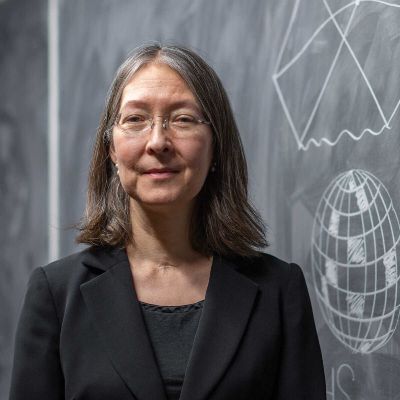 Professor Fay Dowker
Professor Fay Dowker
Fay Dowker is a Professor of Theoretical Physics in the Department of Physics. Visit Fay's Imperial Profile and find information below on her outreach activities.
YouTube videos

The Story of Spacetime
Royal Institution lecture by Prof. Fay Dowker
Fay Dowker tells the story of general relativity and its interactions with Newtonian physics, from Galileo to cutting edge research on the granularity of spacetime.

A celebration of the centenary of general relativity
Imperial hosted talk by Professors Fay Dowker
Imperial hosted talks by Professors Fay Dowker and Jerome Gauntlett as part of the international celebrations of the 100th anniversary of Albert Einstein's Field Equations defining the Theory of General Relativity.

Theories of Everything with Curt Jaimungal
Theories of Everything Podcast of Professor Fay Dowker on Causal Set Theory, Quantum Gravity, Consc
Theories of Everything Podcast featuring Professor Fay Dowker on Causal Set Theory, Quantum Gravity, Consciousness, Non-Locality and Stephen Hawking

Past, Present and Future: The Science of Time
Fay Dowker: Past, Present and Future: The Science of Time
“The question of the nature of time has been part of human intellectual exploration of our world throughout recorded history. Time both attracts and repels investigation: attracts because there is nothing more fundamental to our subjective experience than its temporality and repels because time is a notoriously difficult concept to pin down.
I will explain what our current best scientific theory about time, General Relativity, Einstein’s theory of gravity, tells us about its nature. I will explain how it does justice, beautifully, to one aspect of our experience of time, its subjectivity. I will argue that General Relativity accords better with our experience than the Newtonian concept of time. I will also describe why there is no place in General Relativity for another aspect of time — our experience that it passes! There are indications, however, that future advances in physics, a theory of quantum gravity, may achieve some coordination with our experience of the passage of time.” Fay Dowker

Spacetime and the quantum: united by history
Fay Dowker Imperial Inaugural Lecture
Professor Fay Dowker presents her Inaugural Lecture.
Two major scientific developments - relativity and quantum theory - have advanced our understanding of the physical world. However, despite their success in predicting experimental results, they remain revolutions in waiting. I will argue that the full potential of these discoveries will only be realised when they are brought together into a unified whole. The revolution that general relativity represents - the replacement of three-dimensional space with four-dimensional space-time as both stage and actor in the universe's grand play - has so far been only partially incorporated into the scientific practice of fundamental physics.
Taking space-time seriously, as general relativity demands, means adopting the Dirac-Feynman 'sum-over-histories' approach to quantum theory and gives us our best chance of discovering a theory of quantum gravity, a framework for all of physics.

Spacetime Atoms and the Unity of Physics
Fay Dowker Perimeter Public Lecture
Fay Dowker speaks at a Perimeter Institute Public Lecture on November 2, 2011.
Black holes are hot! This discovery made by Stephen Hawking ties together gravity, spacetime, quantum matter, and thermal systems into the beautiful and exciting science of "Black Hole Thermodynamics". Its beauty lies in the powerful way it speaks of the unity of physics. The excitement arises because it tells us that there is something lacking in our understanding of spacetime and, at the same time, gives us a major clue as to what the missing ingredient should be. Theoretical physicists at Perimeter Institute and elsewhere are pioneering a proposal, known as Causal Set Theory, for the structure held by these most fundamental atoms of spacetime.
In this talk, Professor Dowker describes black hole thermodynamics and argue that it is telling us that spacetime itself is granular or "atomic" at very tiny scales.

Public Debate - Parallel Universes LSE
The British Society For The Philosophy of Science
Public debate where Prof. Dowker argues that the path integral (or sum over histories) approach to quantum mechanics provides a One World interpretation
Professor Michael Duff
 Prof. Michael Duff FRS is an Emeritus Professor and Senior Research Investigator in Theoretical Physics. See Prof. Duff Profile for more details.
Prof. Michael Duff FRS is an Emeritus Professor and Senior Research Investigator in Theoretical Physics. See Prof. Duff Profile for more details.
A full list Prof. Duff engagements can be found here.
Mike Duff's videos

The World in Eleven Dimensions
Friends of Imperial Theoretical Physics 2014 Lecture by Prof. Mike Duff
Friends of Imperial Theoretical Physics lecture "The World in Eleven Dimensions" given by Professor Michael Duff on Friday 30 May 2014.
See the FITP channel for other videos from Friends of Imperial Theoretical Physics.

Prof. Michael Duff on Dr. Abdus Salam
The Black Hole Channel - Setting the Record Straight
In this exclusive video, Prof. Michael James Duff, emeritus professor at Imperial College London, discusses the remarkable scientific contributions and legendary stature of Dr. Abdus Salam. Prof. Duff, a Fellow of the Royal Society and the American Physical Society, is also the 2017 recipient of the Dirac Medal awarded by the Institute of Physics.
Professor Jerome Gauntlett
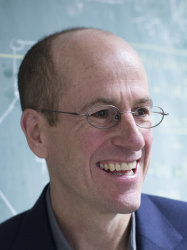 Jerome Gauntlett is Chair in Theoretical Physics in the Department of Physics. His principal research interests are focussed on string theory, quantum field theory and black holes. Visit Jerome's Imperial Profile and find information below on his outreach activities.
Jerome Gauntlett is Chair in Theoretical Physics in the Department of Physics. His principal research interests are focussed on string theory, quantum field theory and black holes. Visit Jerome's Imperial Profile and find information below on his outreach activities.
Jerome's YouTube content

Black Holes and the Fundamental Laws of Physics
Black holes are amongst the most extraordinary objects that are known to exist in the universe.
Black holes are amongst the most extraordinary objects that are known to exist in the universe. Jerome Gauntlett will discuss their fascinating properties and describe the dramatic recent observations of black holes using gravitational waves. He will also explain why it is believed that black holes hold the key to unlocking the next level of our understanding of the fundamental laws of physics.

Black holes, entropy and strings
A hugely popular talk by Professor Jerome Gauntlett from Oct 2019
Black holes are amongst the most extraordinary objects that are known to exist in the universe.
They are predictions of Einstein's theory of General Relativity, our best theory of gravity, and they have recently been directly observed using gravitational waves. By incorporating quantum theory we know that black holes have entropy, a concept that was first introduced to understand the properties of heat.
Professor João Magueijo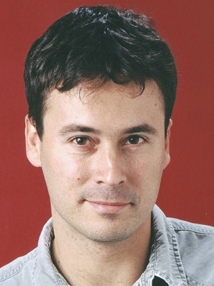
Professor João Magueijo is a Professor of Theoretical Physics. A full listing of Prof. Magueijo's engagement activities is available here.
João's videos

Foro Enciende el Cosmos CajaCanarias
Forum between Lisa Randall and João Magueijo
Foundations discussion between Lisa Randall and João Magueijo

Varying constants
Q&A for philosophers... and not only
Questions and answers session from the mini-series "Cosmology and the Constants of Nature" from the "Philosophy of Cosmology" project. A University of Oxford and Cambridge collaboration.
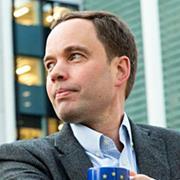 Professor Arttu Rajantie
Professor Arttu Rajantie
Professor Arttu Rajantie's research focuses on applications of quantum field theory in cosmology and particle physics, see Professor Arttu Rajantie's Profile for more details.
A full listing of Prof. Rajantie's engagement activities is available here.
Arttu Rajantie's videos

Higgs Cosmology
Lecture given for Friends of Imperial College
The Higgs field may hold answers to some fundamental questions about the Universe, from its beginnings to its current state and to its eventual end. Recorded October 2020. Our speaker for this live streamed lecture was Arttu Rajantie, Professor of Theoretical Physics, at Imperial College London. The discovery of the Higgs boson in 2012 completed the Standard Model of particle physics, our current theory of elementary particles and the laws that govern them. Professor Rajantie discussed what we have actually learned from it. Professor Arttu Rajantie is a Member of Imperial’s Theoretical Physics group, his research focuses on applications of quantum field theory in cosmology and particle physics. He is also involved in the MoEDAL experiment at the LHC and lectures on Unification - the Standard Model.

Playing the quantum field
Prof. Arttu Rajantie inaugural lecture
Hear Professor Arttu Rajantie on the unsolved quantum field aspects of the Standard Model and their importance in understanding the early Universe
 Professor Andrew J. Tolley
Professor Andrew J. Tolley
Professor Andrew J. Tolley is a Professor of Theoretical Physics in the Department of Physics. His research interests cover gravitational physics, theoretical cosmology and quantum effective field theories and you can read more about his research in his Imperial Profile.
A full listing of Prof. Tolley's engagement activities is available here.
Andrew's videos

Challenging Gravity
Challenging Gravity
Professor Andrew Tolley, Professor of Theoretical Physics, will explain how, from a particle physics perspective, Massive Gravity is the natural competitor to General Relativity, and how nature differentiates between the two

Black Holes and Holographic World
Black Holes and Holographic World
Public lecture by Prof. Andrew J. Tolley taking you on a journey from Black Holes to the Holographic World
"Excellent lecture, particularly for me as a non-mathematician."

Origin scholars
From Newtonian Gravity to Einstein's Theory of General Relativity
A public lecture by Prof. Andrew J. Tolley overviewing the transition from Newtonian Gravity to the foundation of modern physics and what led Einstein to the Theory of General Relativity
Professor Toby Wiseman.jpg)
Professor Toby Wiseman is a Professor of Theoretical Physics in the Department of Physics. His research focuses on fundamental aspects of gravity, black holes and quantum field theory, see Prof. Wiseman Imperial Profile for more details.
A full listing of Prof. Wiseman's engagement activities is available here.
Toby's videos

Space and time: a modern perspective
Professor Toby Wiseman lecture
Professor Toby Wiseman discusses why probing space and time on the tiniest quantum scales could us understand black holes and the big bang

The exhibition Time at Cromwell Place
“Space and Time : A Modern Perspective” by Dr. Toby Wiseman

The Science of Stephen Hawking
Watch Toby's personal insight into Professor Stephen Hawking unique contributions to knowledge
Professor Stephen Hawking (1942 - 2018) was an iconic scientist who worked on fundamental questions in black holes and the origin of the universe. His research was combined with a passion for communicating his work to the general public, notably in his book A Brief History of Time which was followed by many other books and TV programmes. In a celebration of his life and work, Professors Toby Wiseman and Richard Battye discussed his science. Toby and Richard both worked alongside Hawking in the Department of Applied Mathematics and Theoretical Physics at the University of Cambridge and will give a personal insight into his unique contributions to knowledge.
Popular Books by Imperial Theoretical Physicists
Useful Links
- Imperial College London's Outreach Office
- Thinking of applying to study Physics?
- Women in Physics
- Physics LGBT+ Allies Network
- The Blackett Lab Family
